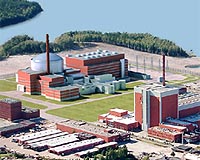 |
Beijing (AFP) March 17, 2011 The atomic crisis sparked by Japan's massive earthquake and tsunami is throwing a spotlight on energy-hungry China's own plans to build dozens of nuclear power plants despite questions over safety. In a nod to mounting concerns following Japan's troubles, China on Wednesday ordered safety inspections of its nuclear facilities and temporarily suspended approval for new nuclear projects pending formulation of new safety rules. But it remains to be seen whether the world's second-largest economy will significantly slow down a national nuclear drive dogged by questions over regulation and emergency preparedness. China operates 13 nuclear reactors, all on its lengthy coastline -- and thus also potentially vulnerable to a tsunami. More than two dozen others are being built -- estimated to account for 40 percent of all reactors being constructed worldwide -- while 50 more are on the drawing board. China is going nuclear to meet soaring energy demand and reduce its world-leading fossil fuel emissions, but many say proper safeguards are not yet in place in a nation already prone to safety scares and industrial accidents. "There has been an inter-agency debate in China about the speed of which nuclear energy needs to be developed," Mark Hibbs, senior associate for the Carnegie Endowment's nuclear policy programme, told AFP. "The faster the Chinese programme expands, the more challenging it will be for the Chinese safety authorities to ensure that safety standards are being adhered to." In 2008, China announced a goal of up to 40 gigawatts of installed nuclear capacity -- or about 40 reactors -- by 2020, but state media reports have said up to 80 gigawatts could be installed by then. Experts have warned that the crisis in Japan, where workers are battling to avert a meltdown at a nuclear plant damaged by last Friday's enormous earthquake and tsunami, should provoke a global rethink of atomic power. But Zhang Lijun, vice minister of environmental protection, said Saturday that while China will learn from Japan's problems, it "will not change its determination and plans for developing nuclear power." China's plans are shadowed by a lack of transparency and a National Nuclear Safety Administration that is hiring hundreds of young and inexperienced regulators as it struggles to keep up with building activity, Hibbs said. They face the daunting task of overseeing China's "panoply" of reactor designs from France, Russia, Canada and the United States, he added. Hibbs also said some foreign safety experts working with the Chinese have already raised fears over the use of counterfeit -- and potentially faulty -- equipment made in China and being used in plant construction. "They have to prevent counterfeit equipment from being used, make sure all the equipment in the Chinese nuclear programme is legitimate, certified and meets very rigid quality standards," Hibbs said. Corruption has emerged as another worry after the head of the China National Nuclear Corporation (CNNC), Kang Rixin, was sacked in 2009 and placed under investigation for "a serious disciplinary matter" -- a term that usually refers to graft. Chen Jinyuan, a nuclear safety inspector at the environmental protection ministry, was quoted Wednesday by state media saying China badly needed an "atomic energy law." Otherwise, responsibilities for nuclear power development, supervision, and contingency planning were not legally defined, he said. Wednesday's order by the State Council, or cabinet, to temporarily halt new nuclear approvals pending safety rules could ease some concerns, but experts say much more needs to be done. China has suffered its own share of earthquakes, including an 8.0-magnitude disaster in the southwestern Sichuan region in 2008 that left 87,000 people dead or missing. "As far as designing an emergency response plan to accidents, we need to make more and better assessments on the impact of natural disasters," Chen Hao, head of the Sichuan Nuclear Energy Institute, told AFP. "As far as the speed in which China is developing nuclear energy, I think we need to be more cautious. No matter if it is choosing sites or building the projects, we need to be more cautious in all areas."
Share This Article With Planet Earth
Related Links Nuclear Power News - Nuclear Science, Nuclear Technology Powering The World in the 21st Century at Energy-Daily.com
 Indonesia's nuclear plans intact amid Japan crisis
Indonesia's nuclear plans intact amid Japan crisisJakarta (AFP) March 16, 2011 Indonesia said Wednesday that it will press on with plans to build a nuclear plant close to a volcanic fault line, despite the nuclear emergency in earthquake and tsunami-ravaged Japan. "If we pick to build it on Bangka island, surely it will be based on several considerations which are in line with international safety criteria," the National Atomic Energy Agency (BATAN) chief Hudi Hastowo ... read more |
|
| The content herein, unless otherwise known to be public domain, are Copyright 1995-2010 - SpaceDaily. AFP and UPI Wire Stories are copyright Agence France-Presse and United Press International. ESA Portal Reports are copyright European Space Agency. All NASA sourced material is public domain. Additional copyrights may apply in whole or part to other bona fide parties. Advertising does not imply endorsement,agreement or approval of any opinions, statements or information provided by SpaceDaily on any Web page published or hosted by SpaceDaily. Privacy Statement |